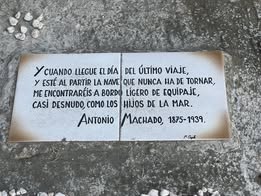Recuerdos del Circo
Los circos trashumantes,
de lamido perrillo enciclopédico
y desacreditados elefantes,
me enseñaron la cómica friolera
y las magnas tragedias hilarantes.
El aeronauta previo,
colgado de los dedos de los pies,
era un bravo cosmógrafo al revés
que, si subía hasta asomarse al Polo
Norte, o al Polo Sur, también tenía
cuestiones personales con Eolo.
Irrumpía el payaso
como una estridencia
ambigua, y era a un tiempo
manicomio, niñez, golpe contuso,
pesadilla y licencia.
Amábanlo los niños
porque salía de una bodega mágica
de azúcares. Su faz sólo era trágica
por dos lágrimas sendas de carmín.
Su polvorosa apariencia toleraba
tenerlo por muy limpio o por muy sucio,
y un cónico bonete era la gloria
inestable y procaz de su occipucio.
El payaso tocaba a la amazona
y la hallaba de almendra,
a juzgar por la mímica fehaciente
de toda su persona
cuando llevaba el dedo temerario
hasta la lengua cínica y glotona.
Un día en que el payaso dio a probar
su rastro de amazona al ejemplar
señor Gobernador de aquel Estado,
comprendí lo que es
Poder Ejecutivo aturrullado.
¡Oh remoto payaso: en el umbral
de mi infancia derecha
y de mis virtudes recién nacidas
yo no puedo tener una sospecha
de amazonas y almendras prohibidas!
Estas almendras raudas
hechas de terciopelos y de trinos
que no nos dejan ni tocar sus caudas...
Los adioses baldíos
a las augustas Evas redivivas
que niegan la migaja, pero inculcan
en nuestra sangre briosa una patética
mendicidad de almendras fugitivas...
Había una menuda cuadrumana
de enagüilla de céfiro
que, cabalgando por el redondel
con azoros de humana,
vencía los obstáculos de inquina
y los aviesos aros de papel.
Y cuando a la erudita
cavilación de Darwin
se le montaba la enagüilla obscena,
la avisada monita
se quedaba serena.
como ante un espejismo,
despreocupada lastimosamente
de su desmantelado transformismo.
La niña Bell cantaba:
«Soy la paloma errante»;
y de botellas y de cascabeles
surtía un abundante
surtidor de sonidos
acuáticos, para la sed acuática
de papás aburridos,
nodriza inverecunda
y prole gemebunda.
¡Oh memoria del circo! Tú te vas
adelgazando en el frecuente síncope
del latón sin compás;
en la apesadumbrada
somnolencia del gas;
en el talento necio
del domador aquel que molestaba
a los leones hartos, y en el viudo
oscilar del trapecio...
Memories of the Circus
Travelling circuses,
with the dainty little dog’s
encyclopaedic brilliance
discrediting the elephants,
taught me trivial comedies,
laughable super-catastrophes.
On came the aeronaut first,
hanging on by the skin of his toes,
daring explorer in reverse;
whether or not he glimpsed the poles,
north or south, he had personal scores,
God of the Winds, to settle, of yours.
In burst
the clown, like a loud and dubious noise,
bump and bruise, infancy, lunacy,
all nightmare and naughtiness.
How he was loved by the kids
for coming out of a magic
candy-pot: just his face was tragic,
cochineal tear this side and that.
Powdered thick, he could either be thought
Of as spick and span, or as caked in smut;
His glory was a conical hat,
precarious, pert, on his occiput.
The clown touched
the bearded lady and found
she was all of sugared almond, to judge
from the lifelike mime of the whole of his frame,
when he raised his audacious fingertip
to his cynical gluttonous tongue.
The day the clown presented a sniff
of the bearded lady to be savoured
by the Honourable Governor of the State,
that was the day I discovered
Executive Power disconcerted.
You faraway clown of my early days,
my virtues pristine, so carefully raised:
I couldn’t be tarred with any suspicion
of almonds and bearded ladies forbidden!
These sugared almonds,
dashing, in velvet and frills,
we’re not to touch the hem of their train.
The futile goodbyes
to each idolised Eve revived,
who denies us so much as a crumb,
but who dins into our spirited blood
a cringing, a cadging
of almonds, not to be had…
A four-handed creature
in frou-frou and zephyr
came galloping into the ring,
in fear, as if human,
and mastered the nasty obstacle-course
and the awkward paper hoops.
And when to the learned
demurring of Darwin
they dressed her, obscene, in the frou-frou,
the wise little monkey
kept calm as if faced with a trick in the glass,
resigned to the dismal transformation.
“I’m the wandering dove,”
warbled little Miss Bell:
and from bottles and bells
gushed a tumbling fountain
of watery sounds
for the watery thirst
of weary papas,
the flighty nurse
and the querulous child.
O circus memory, fading away
in the unrhythmical
clashing of brass,
the heavy drowsiness
of the gas;
the stupid skill
of that lion-tamer who used to tease
the well-stuffed beasts, and the vacantly
swinging trapeze…
